Old school with Ray Browning
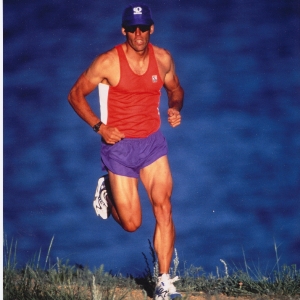
Ray Browning is one of the classic strongmen of long course racing in the 80’s and 90’s. During our chat, we delve in to the history, the development of triathlon, and the many laughs he had along the way.
Slowtwitch: For all the newbies out there, please give us a historical breakdown of Ray Browning the triathlete.
Ray Browning: Sure. I raced from about 1986 until about 1995 – so about a 10 year period. My first Ironman was in 1986; it was the third triathlon I ever did. I had come from bike racing, so the duration of the event wasn’t that intimidating… it was more the running part. But I think I ended up 16th place in that race. That may sound impressive, but keep in mind that there were only about 200 people racing that year. It was in the early days of the sport.
Over the course of that 10 year period, I focused more on long races – although I occasionally did some short races… I just wasn’t very good at them. I think I did 23 Ironman races in that span, and won 7 of them. I was in Hawaii 9 different years. The best I did was 6th, the worst I did was… far worse than 6th.
It was a good career back then. There were a very limited number of Ironman races around the world – maybe 6. You know – Japan, New Zealand, Australia, Europe, Canada, and Hawaii… that was basically it. We didn’t have races all over the country and all over the world to participate in. I typically raced in 3 or 4 Ironman races a year.
The second Ironman race I did was Ironman New Zealand in 1987, and I won that race… which was quite a surprise. But you know, back then the non-Hawaii Ironman races were 2 mile swims, 100 mile bikes, and 20 mile runs. They were actually more like the Nice [France] distance – in terms of duration they were 6 or 7 hour races, instead of 8 hours races. The fastest I think I covered the full distance was at Ironman Europe in 1992, and it took me about 8 hours and 10 minutes, and I was second place. I guess that’s still reasonably fast.
And that was actually a funny race. To go 8 hours 10 minutes and get second place was bad enough – but I also got hit by a car [during the race]. It was a hit-and-run… and I ended up getting a ticket for it! I was in a homestay and the German police came over that evening to remind me that in any collision between pedestrians, bicycles, and automobiles in Germany, you have to leave your information at the scene of the accident – like your driver’s license. It tried to explain to the officer that I didn’t have any information – because I was basically in a swim suit… and I just didn’t remember to bring along my passport with me on race day. {laughs} I actually thought it was a joke and started laughing… my poor homestay guy was about to have a heart attack… probably thought he was going to end up in a German jail. I went to the race promoter the next morning to tell him what happened. It was actually a pretty expensive ticket, like 300 bucks… and he paid for it, so it worked out fine.
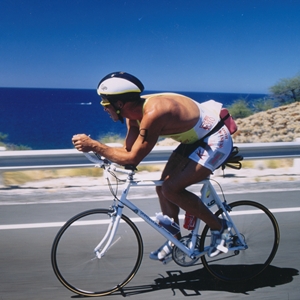
ST: Tell us about your last race in Hawaii.
Ray: It was interesting. I guess people have different ways that they know they’re done. I had been hit by a car in Canada a few years prior. I had really struggled with returning to form; I had a long-lasting injury that took a long time to resolve. I thought I was back in to pretty good shape, but the race didn’t go anywhere near as well as I wanted. I remember running down Ali’i Drive… in prior years that had always been a really uplifting experience. One that was filled with all kinds of excitement – no matter how well your race went. But that year I remember getting close to town and just… wanting to be done. I realized it was the last time I was going to do that – ever. It was a little bittersweet… when it isn’t quite how you anticipate or would like it to end. But it was very clear to me that my motivation to suffer at the level that was required just wasn’t there any longer. And I have not stepped foot on a triathlon race course since then. Gosh, it’s been almost 20 years.
I got in to the sport purely by… there was no plan. I was a bike racer, I went to UCLA to go to graduate school. I got hooked up in this funny world of triathlon. I kind of had this skill as a bike rider. One thing led to another, and the next thing you know people are giving you sponsorship, and you’re traveling around the world racing, and it was great. The career part was never intended; it was more just lucky. But I think it made stepping out of it easier. I never went in to it thinking, “Well this is how I’m going to set myself up to never have to work again.”
ST: That brings up a good point – sponsorship. My perception is that now there are a pretty significant number of professionals who are just barely scraping by. Do you think that has changed since the 80’s?
Ray: That’s a good question. And I would say probably not. Those at the very top who are very well known and can be a brand – they can do well. And that’s always been the case. I would consider myself to be in sort of that second tier, below that. Even though I was winning races, I wasn’t necessarily what I’d say “at the top”. I don’t know whether it was the timing, or my own ineptitude, or whatever… but I could make a living. You could make $100,000 a year adding up prize money and sponsorship and appearance fees. You know it wasn’t seven figures… there were people making that – but it certainly wasn’t me. I think the key difference was that back then there were maybe 50 or 100 people around the world trying to do that. Now, there are exponentially more than that; there are just more people going for the same prize.
I can sympathize with the challenges that all of the top men and women experience. It’s tough – it’s insane hard to try to make a living doing a sport that requires the time that this sport requires. It’d be one thing if you could do it in an hour a day, but we know that wouldn’t work very well.
ST: You’re now a professor at Colorado State – please tell us about the career shift. Do you follow triathlon anymore?
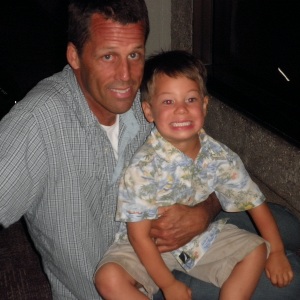
Ray: I’m glad you asked that question. I had gone to graduate school. I was an engineering undergraduate at Colorado State University. While getting that engineering degree, I had an exposure to the early pioneers of biomedical engineering. It really struck me that – wow – people were applying engineering to solving health problems. I then went on to UCLA to do a PhD. I loved it; I saw all this research going on; I loved the teaching element of it. While I was there, we were doing cycling research, and some peripheral work in spinal rehabilitation with some fantastic people – it was a really really great environment. During that time I got the triathlon bug, and went off to do that – and ended up abandoning the PhD for a Master’s degree. But that enthusiasm and that interest in the academic environment never went away.
After I stopped racing, I ended up getting involved in several ventures that were really trying to connect health [and] athletic performance. But through that I got exposed to some people on the totally opposite end of the performance spectrum. They were obese, they were sedentary… and I realized there was this significant portion of the population who were in this state and not experiencing any of what I had experienced. And I wanted to understand it – what is it about these individuals and how they move – what are their behaviors and attitudes… what added up to cause all of this.
Finally, things came together and I decided I wanted to go back and do a PhD. It turned out that Dr. Roger Kram (who is now a dear friend) was in Boulder, and I was living in Boulder. I approached him and shared my intrigue with this whole obesity epidemic, and I that wanted to apply my experience with movement… and I wanted to see if we could try to help in some way. So I did my PhD and did a post-doc in the health and sciences center in Denver on obesity. Now I’m [at Colorado State] – and a big part of our work continues to be figuring out how to get more individuals engaged in physical activity.
In a lot of ways I think my withdrawal from the multisport community has simply been due to being so involved in to this new community. I’m doing something else that I really enjoy – teaching, mentoring students, and doing research.
I do think that my athletic success in my 20’s and early 30’s really set me up for the “suffering” – I don’t know, the intellectual suffering – of academia. It’s just about being willing to be uncomfortable for long periods of time. I think that can apply intellectually, it can apply psychologically, it can apply physically. You can use that skill across any area of your life.
ST: I understand there are some old stories about your training that may not be public. Specifically, a story about bonking on a ride, and trying a new nutrition strategy on-the-fly. Can you share it with our readers?
Ray: That’s actually a very funny story. So I was a junior in college; let’s call it 20 years old. I was really getting excited about this whole bike racing thing. For a summer, I took a job in Casper, Wyoming, and was about the only bike rider in town. And I knew nothing about physiology and nutrition. One weekend I decided I was going to go out and ride my bike.
So I got on my bicycle and I started riding on this very remote paved road. I just thought to myself, “Gosh, I’m having a great time, this is such a cool sport, and I’m going really fast…” And I went out considerably farther than I thought, because I was just going based on time, and doing an out-and-back. Turns out I had been riding with about a 35mph tailwind. I got to my turnaround point in the middle of nowhere, and I had literally ridden without seeing anything – there was no store, there were no houses, nothing. I started riding back and was thinking, “Wow, I’m getting really hungry… I’m like, really really starving”.
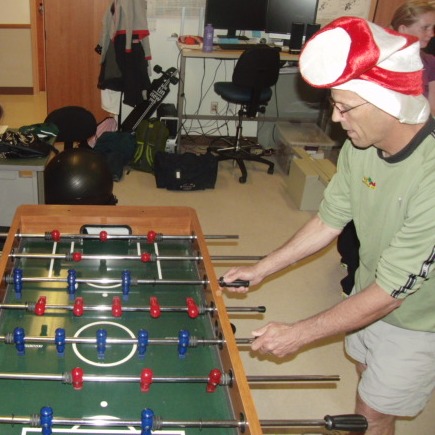
I was getting worse and worse, and I decided that, “Well, I think I need to stop”. I had a little bit of water with me, and just sit down in the grass on the side of the road. I thought that I needed to eat something, and all there was around was just the grass… I figured it would have at least some nutritional value. Of course, I couldn’t really swallow it, and ended up throwing it up… and just decided to take a nap. I probably fell asleep for about half an hour, and got back on the bike… and it took me FOREVER to get back in town. I think the first thing I did when I got back was spend about eighteen dollars at a convenience store. It was horrible, but a great lesson for me.
But that was one of the fun things – well, it’s funny now. But one of the most exciting parts of being involved in the sport at that time was that we didn’t know what the heck we were doing. We didn’t know what to eat, we didn’t know how much to eat, we didn’t know really how to train. It was just, ‘Alright… I guess we’ll try this.’ You’d get hurt, or we’d get totally over-trained. We generally just applied volume versus intelligence.
But it was great; the canvas was blank. One of the things I always enjoyed about triathlon in the early days was that there was a significant number of people standing around you at the starting line that really had no idea at all whether they could finish. They didn’t know! So there was a sense of adventure – and certainly some sense of fear as well. And today there’s probably less of that. I don’t think that’s bad necessarily; I just think it’s what is driving people towards different things like adventure racing and obstacle course racing. People seem to need that “I don’t know…” aspect.
And back then there was a lot of entertainment in it. Now, given I haven’t been at the front of an Ironman race in a long time. But the front of races back when I was racing… tended to be funny. There was a lot of stuff happening that people today might not think is true… that these guys were telling jokes at the front of Ironman races. And they were – there was always a certain amount of that going on. Paul Huddle was hilarious; the guy was absolutely hysterical.
I remember one year at Ironman Canada, we were in a big group at the front and rolling through an aid station. Huddle comes rolling in there with this dead serious look on his face – and he was asking for cigarettes. And there was complete disarray in the aid station – because nobody had any, of course! And finally a few miles later, a guy on a moped rolls up beside us. He was totally serious about it, and he had a pack of cigarettes for Huddle. He was saying, “We had to go find them – I’m so sorry, I’m so sorry – we didn’t have any back there!”
ST: Did Huddle take them?
Ray: Oh yeah, he said "thanks" and put them in his pocket. I never saw him use one of them, but he took them. I almost dropped out of the race I was laughing so hard.
But that’s how it was. It was always the same guys racing every weekend, and we got to know each other. After about 30-40 miles in to the bike, things like that started happening.
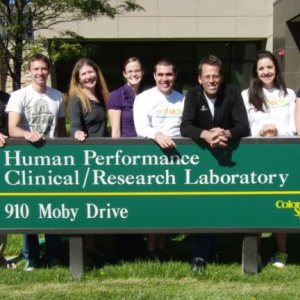
ST: What did you guys do for race nutrition back then? This had to be way before gel packets and all of the modern products.
Ray: Well, gosh… yeah, there were no gel packs. But there were products that emerged in the late 80’s… things like Ultra Energy, and these higher carbohydrate solutions. But our nutrition plan was probably as varied as a supermarket – everything from gummy bears to the supposedly sophisticated high carbohydrate products. And I figured out about what I needed – energy density that was mostly carbohydrate, and a few hundred calories per hour… or maybe even a little more than that. But I wasn’t so picky as to what it exactly was – it was more the flavor of the month… whatever sounded good and I could eat.
A lot of it was just experimentation. I remember one year at Ironman Canada… maybe 1988 or 1989. I was trying out this new ultra energy drink mix, and I had this sort-of under-saddle bladder system. It was kind of like a Camelbak, and it had a hose that ran along the top tube. So I mixed this stuff up and put it in the bladder, and this was my whole nutrition plan – like, everything for the entire bike ride. What happened was it sat in the sun for a couple of hours, and it actually started to ferment. And it expanded. So about 20 miles in to the bike ride, the entire bladder blew up – just exploded all over the back of the bike, and all over me. And it smelled like some nasty, fermented… I don’t know. But it was nasty, and my legs were sticking together. {laughs}
So to answer your question, we had nowhere near the degree of sophistication of today. It was more just what you could cobble together. But I think it maybe even helped us. Because we didn’t have these [race day formulas], we trained with the same stuff we raced with… so we couldn’t really screw it up. We weren’t able to be tempted to try something new right before the race, and our stomachs were pretty bomb-proof.
ST: To change gears, I know you were very vocal against the use of performance enhancing drugs. What is your take on it from a “then vs. now” standpoint?
Ray: I’ll start the answer by saying that I never observed anyone taking performance enhancing substances during my career. Certainly, coming from the cycling world I was aware of it. And before that I had done a lot of weight training, and that scene is absolutely full of [drug use]. But I had a very strong belief that it was… just taboo. And I think what that stems from – for me – was that I felt like I never achieved my full potential, just with what I was handed. I never had what I consider to be the perfect season or perfect race – and even the ones you win. And I never felt like the things I needed to improve on were things that a drug could necessarily help with. Most of it, quite honestly, was in my head – you know, what’s the psychology behind it? So I always took the approach that until I was doing everything else perfectly, then maybe drug use would be more compelling? I doubt it… and it never worked out that way. To this day, I just think it’s something you don’t do – it’s cheating.
And I suspect that it’s certainly happening now, just like it was then. As much as it troubles me, endurance sports and performance-enhancing drugs have always had a relationship. I find myself now wanting… I really enjoy watching the sport, and I enjoy the stories, and the talent… so now I try to say, “I’m going to enjoy that.” And enjoy it as a celebration of what we as human beings are capable of doing, and try to ignore the dark side of it. Would I like to see sport be clean? Yes, absolutely. Do I think it will ever be truly clean? Probably not.
ST: Compare the general lifestyle of then and now. We always heard – back then – the pro’s had the attitude of “race hard, party hard”. Is my assumption accurate, and who was the wildest of the bunch?
Ray: {laughs} Yes, it was very Wild West. I recall several times, the morning after the party thinking, “Huh, well geez, I’m back in my hotel room… I have no idea how that happened.” There was a lot of that. Greg Welch was notoriously out of control – and I say that in the best possible way. He was clearly an unbelievably talented person, and had this incredible amount of life energy.
We trained hard together, and we trained ourselves in to the ground. We’d kill each other in races, and then we’d absolutely get shit-faced together. {laughs} And I really liked that. It was a great part of being in that fraternity of people. Mark [Allen] maybe didn’t do it so much, but all of the other guys, Tinley, Welch, Huddle… there was a group that was clearly looking to entertain ourselves after the race. We’d get to go to a lot of really cool places – drinking sake in Japan, or next thing you know we’re in some disco in Europe at 3 o’clock in the morning thinking, “This is really fun!” And I think that it just attracted those of us who just had extra energy to burn. I think it happens in a lot of sports – that sense of competitive release, and then the desire to let loose a little bit.
ST: Thanks for all of your time, is there anything else you’d like to add?
Ray: No problem, and thanks for the opportunity. I’m an old guy and don’t get too many calls about this stuff anymore. {laughs}
I’m very thankful for the opportunities I had, and I actually enjoy being somewhat anonymous now. My students inevitably figure it out over the course of a semester – and something about the dynamic changes. You’re no longer just a nerdy academic, and you have something else to offer in terms of practical life experience that appeals to them. It’s nice to be in that place and be able to have the perspective and experience, and share it with others.


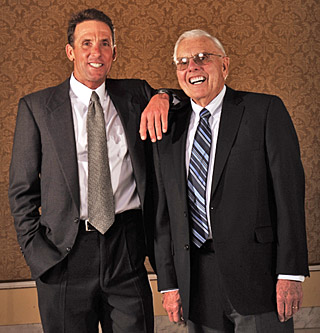
Start the discussion at slowtwitch.northend.network